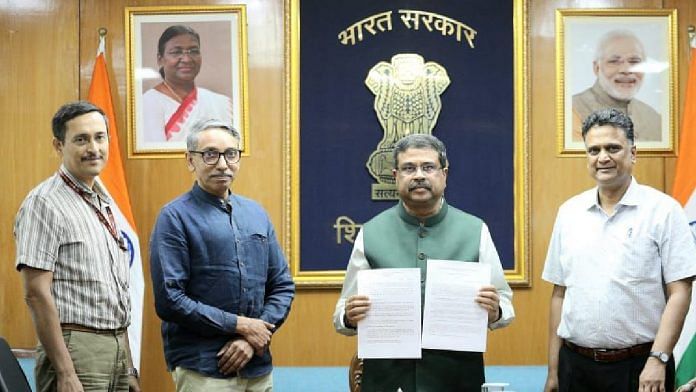New Delhi:Releasing a new set of guidelines for the creation of “more quality-focused” deemed universities, the government Friday introduced a new category of higher education institutions with courses ranging from strategic studies to promotion of the preservation of the Indian cultural heritage, languages or environment among others.
The ‘Distinct Institutions’ will be exempt from having to meet the eligibility criteria —accreditation and ranking — set by the University Grants Commission (UGC).
According to the UGC (Institutions Deemed to be Universities) Regulations, 2023, a ‘distinct institution’ is defined as “an institution starting from the beginning with the focus on teaching and research in unique disciplines and/or addressing the strategic needs of the country or engaged in the preservation of Indian cultural heritage or preservation of the environment or dedicated to Skill Development or dedicated to Sports or languages or any other discipline(s), so determined by the Expert Committee of Commission.”
Union Education Minister Dharmendra Pradhan released the new regulations, whose draft regulation was released in November last year.
“UGC (Institutions Deemed to be Universities) Regulations, 2023, will facilitate creation of many more quality-focused deemed to be universities in an objective and transparent manner. The new simplified guidelines will encourage universities to focus on quality & excellence, strengthen the research ecosystem and have a long-term impact in transforming our higher education landscape,” Pradhan said in a statement.
A deemed university is an institution of higher education, other than a university, that has degree granting powers.
The new regulations replace the UGC (Institutions Deemed to be Universities) Regulations, 2019 and are built on the principle of a “light but tight regulatory framework” in line with the National Education Policy 2020.
Changes in regulations
The latest regulations aim to encourage universities to focus on quality and building a robust research ecosystem.
According to the latest regulations, the eligibility criteria for deemed universities requires them to have a National Assessment and Accreditation Council (NAAC) ‘A’ grade with at least a 3.01 CGPA (Cumulative Grade Point Average) for three consecutive cycles, or National Board of Accreditation (NBA) accreditation for two-thirds of eligible programmes for three consecutive cycles.
Previously, the CGPA required was 3.26 and the institutions were required to have existed for at least 20 years.
NAAC and NBA are India’s top accreditation bodies.
At the time of application for deemed university status, these institutions should figure in the top 50 of any specific category of National Institutional Ranking Framework (NIRF) for the last three years continuously or in top 100 of overall NIRF Ranking for the last three years continuously.
According to the new guidelines, a cluster of institutions managed by more than one sponsoring body can also apply for deemed university status.
Additionally, institutions deemed to be university may start new courses or programmes in any field in their existing campus and approved off-campus centers. They can do it with the prior approval of its Executive Council and, also wherever applicable, with the approval of the relevant statutory council.
Previously, in order to set up off-campus centers universities were required to get an approval from the Ministry of Education.
(Edited by Anumeha Saxena)
Also Read: Survey of students, limiting access to database — how NAAC is initiating reform with ‘quick fixes’



